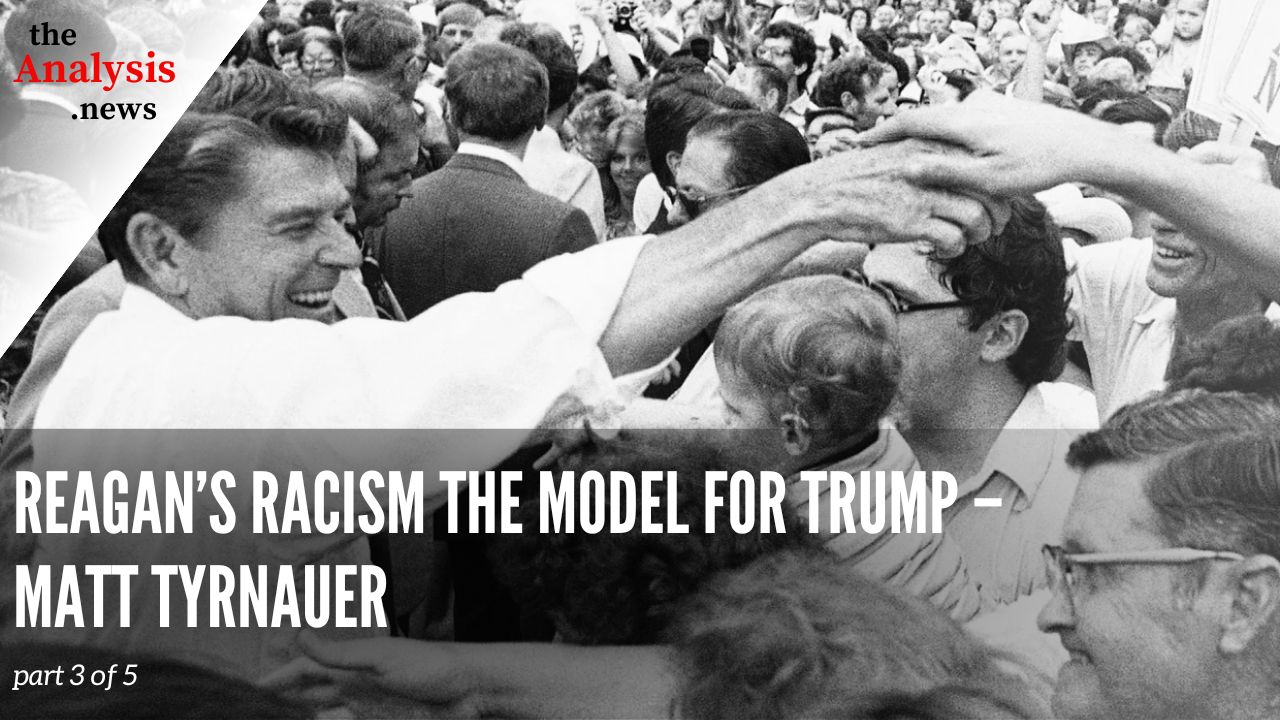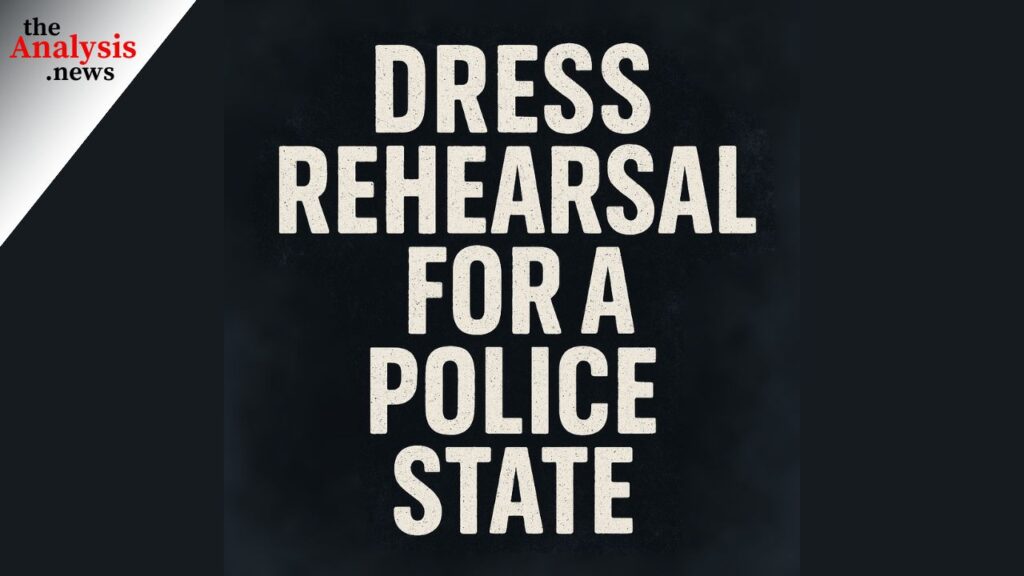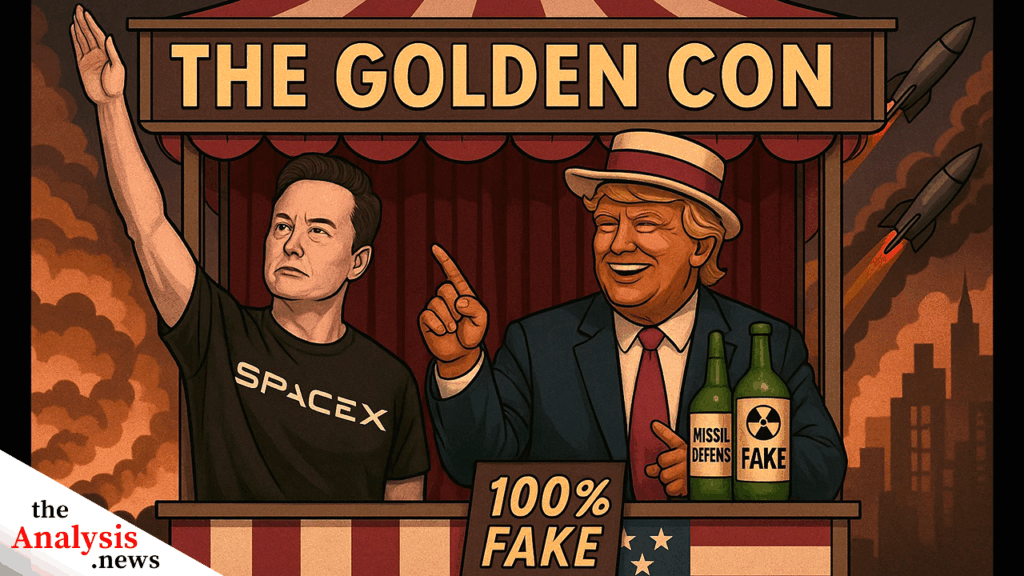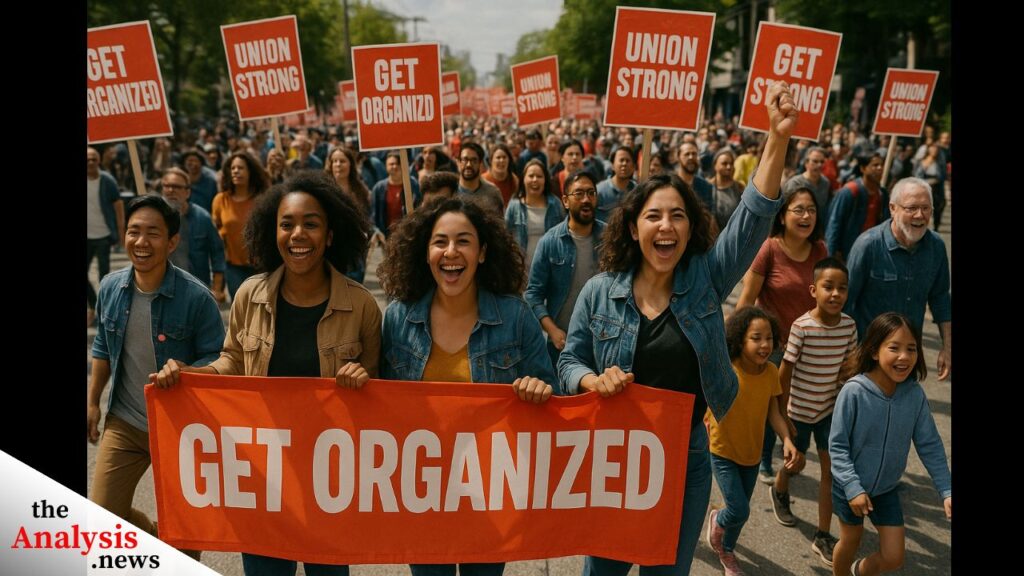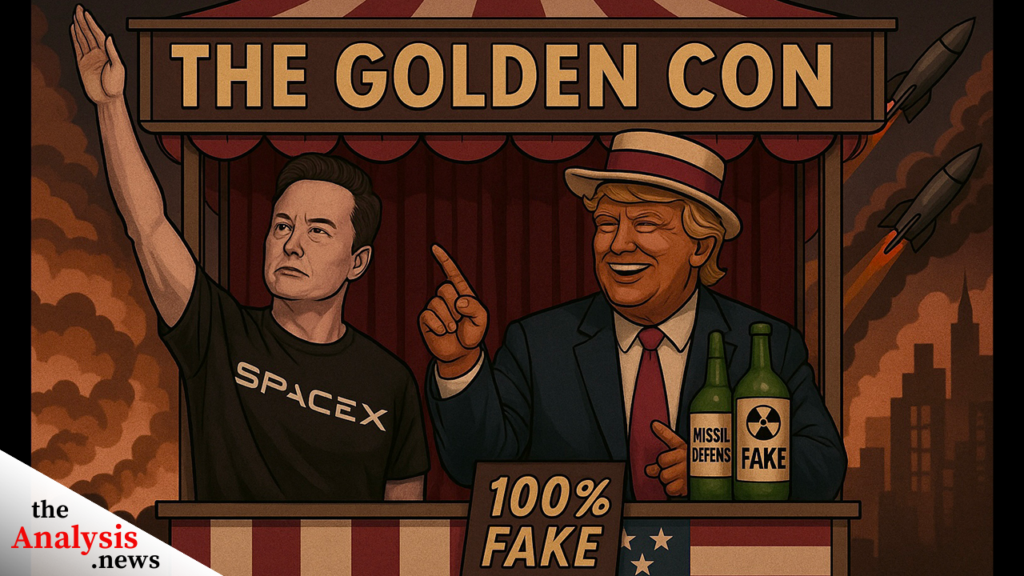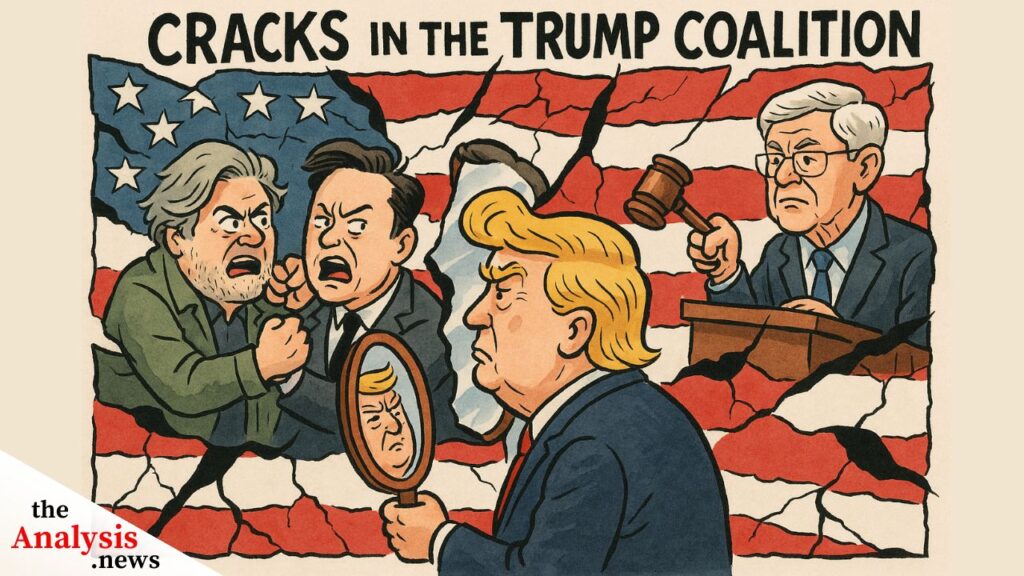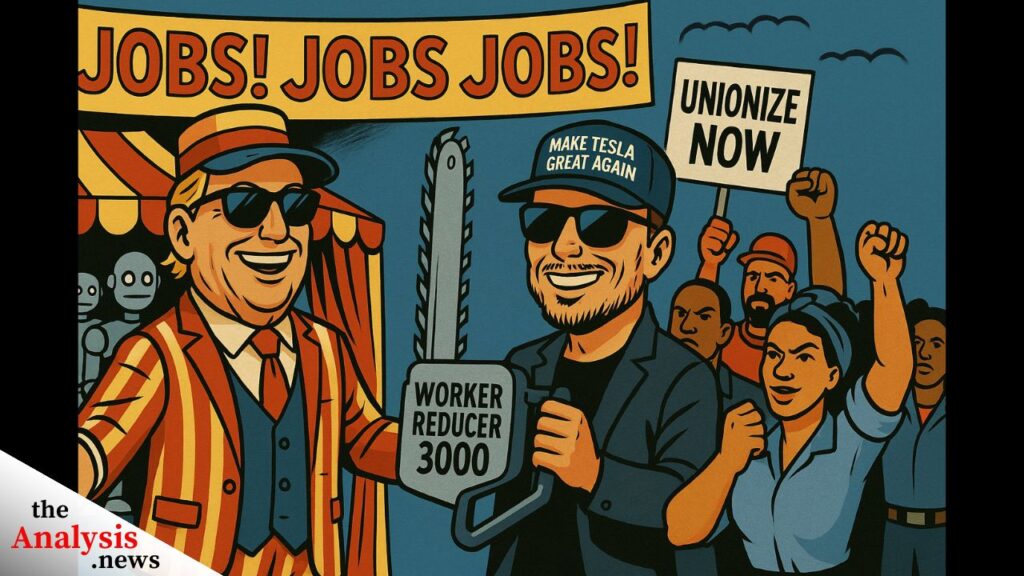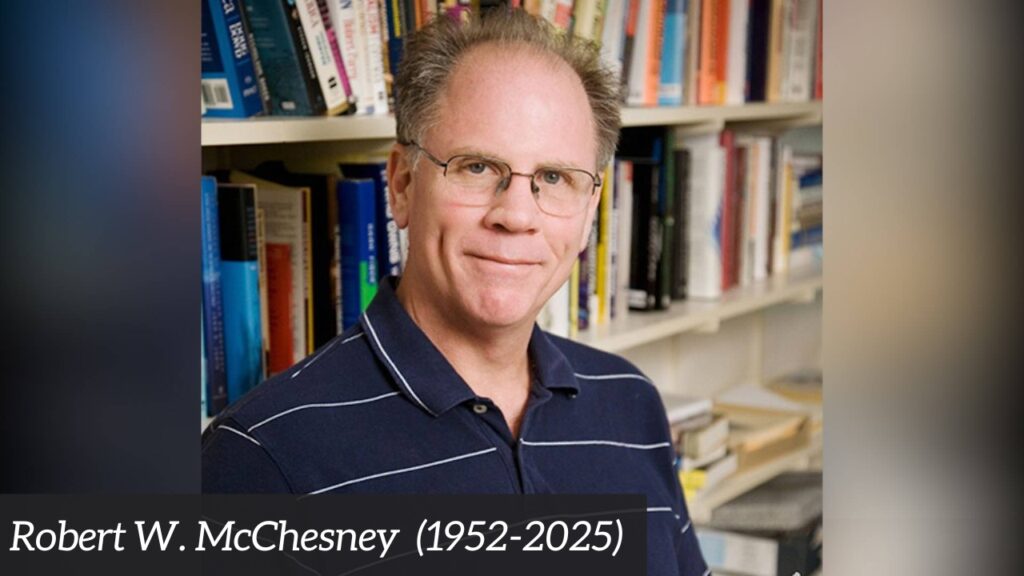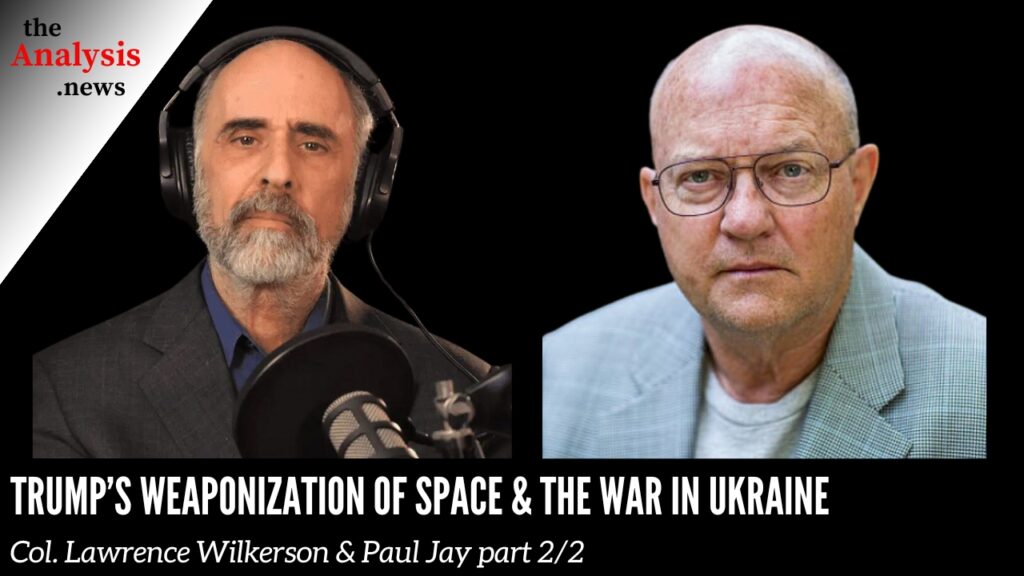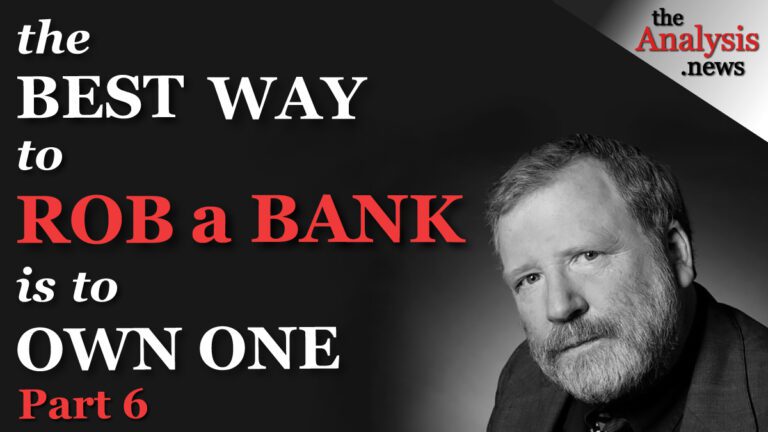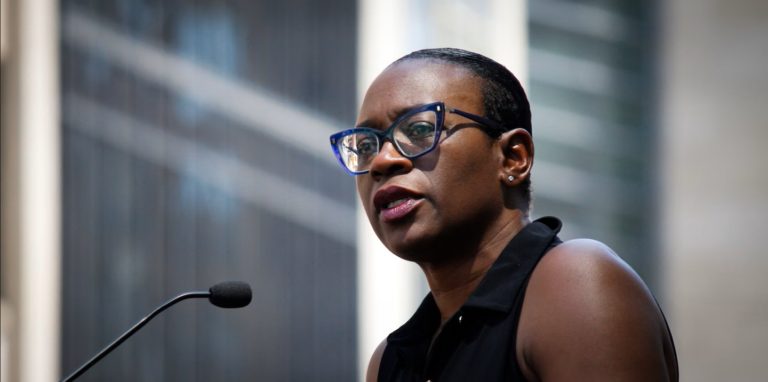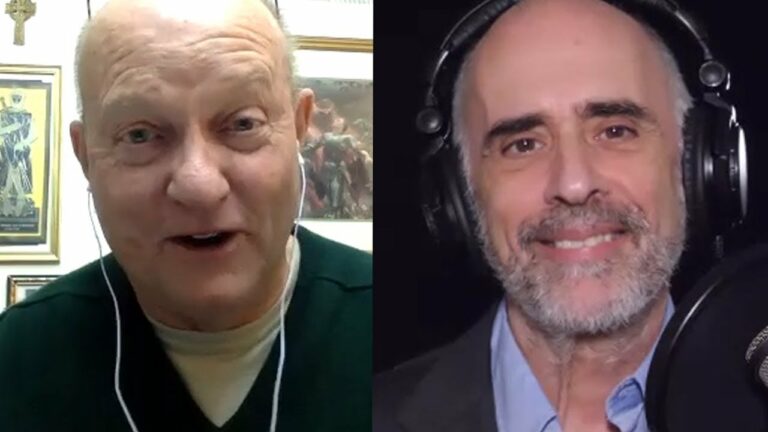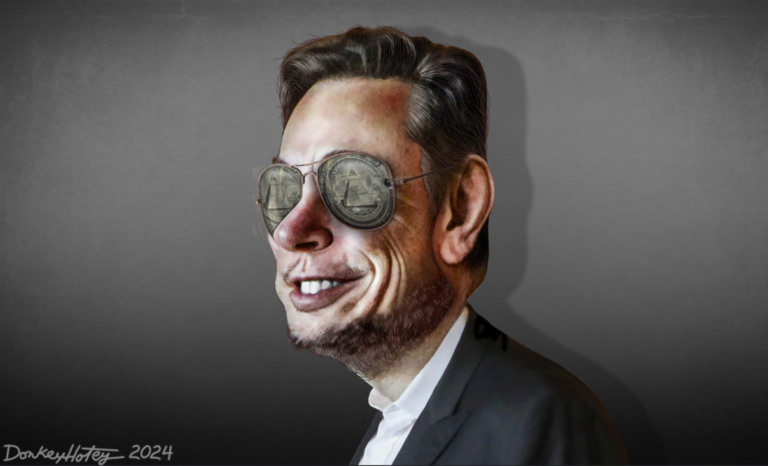Reagan was the master of racist “dog whistles,” plausible deniability that allowed Reagan to protect himself. It has allowed the Republican Party for the last four decades to deny who Ronald Reagan was and turn him into a hero. Matt Tyrnauer, director of “The Reagans” on Showtime, joins Paul Jay on theAnalysis.news. This interview was originally published on February 9, 2021.
Reaganism is the Model for Trumpism – Matt Tyrnauer, director of ‘The Reagans’ pt 1/5
Ronald Reagan: The Face of Racism & the Military-Industrial Complex – Matt Tyrnauer (pt 2/5)
Ronald Reagan: “Small Government” a Smoke Screen for Racism and Smashing Unions – and Host, Paul Jay (pt 4/5)
Reagan, the Media and the United States of Amnesia – “The Reagans” part 5/5
Paul Jay
Hi, welcome to theAnalysis News podcast. I’m Paul Jay. Please don’t forget there’s a donate button at the top of the webpage.
There’s a segment in the Showtime series, The Reagans, about dog-whistling – Reagan’s pandering to racism without using overtly racist words. Again, it’s impossible not to see the model for Trump in all this.
Excerpt from The Reagans
“Let us pledge to each other with this great lady looking on that we can and so help us God, we will make America great again.”
Reagan’s reputation as a dog whistler has not had a sufficiently negative impact on his legacy. Dog-whistling is all about plausible deniability that allowed Reagan to protect himself, and that has allowed the Republican Party for the last four decades to deny that that’s who Ronald Reagan was and turn him into a hero. To insist that he really did care about the average American working family. But when people stand back, they see that, in fact, Reagan was a divisive figure, someone willing to do what he knew was wrong to divide Americans as a way to win power. Reagan’s genius as a politician was that he wrapped his racism in a facade of fatherly love.
Paul Jay
Now joining us is the director and writer of The Reagans Matt Tyrnauer, who’s also the filmmaker of Valentino: The Last Emperor, which was shortlisted for an Academy Award for best documentary feature, and Where’s my Roy Cohn another must-see if you want to understand the political forces that gave us Trump. Thanks for joining us, Matt.
Matt Tyrnauer
Thank you.
Paul Jay
So talk about the evolution of Reagan. We talked about from FDR-ish, liberal-ish head of a union, to a pro-Goldwater politician who then becomes Goldwater-ish politician himself, but also this arc to adopting as a tactic, this dog-whistle racism. So how does that develop and tell us the story?
Matt Tyrnauer
Well, Reagan was on-trend because after the Second World War leading into the Johnson and civil rights era, the use of overt racist language really was not going to be permissible in the public arena. So clever politicians figured out that you could use coded language and have the same effect. And this eventually became labeled as dog-whistle racism. So Goldwater, I think, practiced it. But I think Reagan really elevated it to an art form and was the master of the form.
Excerpt from The Reagans
The question of whether my father was racist is a troubling one for me. There was a concerted effort to undermine the civil rights movement. A new language developed to trigger unacceptable social hatreds.
“Our city streets are jungle paths.”
Reagan can turn around and say, me, I didn’t say anything about race.
Matt Tyrnauer
A lot of this he wrote himself, he was very good at coming up with little bumper sticker phrases that stuck in your mind. So some of his classics were “welfare queen” which he based on a real character named Linda Taylor, there was recently a book, sort of a biography of Linda Taylor.
She wasn’t really deserving of the moniker welfare queen. She was kind of like a check-hider and a serial petty criminal. She might have stolen a Social Security check or two, I can’t remember. But she was written about in the press and he would clip these newspaper articles and he incorporated her into his banter and into his speeches. And he referred to her as the welfare queen. And that really stuck. He saw it was sticky, saw it got a good response, he was very good at reading a crowd, of course.
Another dog-whistle phrase that Reagan was famous for was “young bucks” he referred to in the wake of the Watts Uprising when he was running for governor. 1965/66. He was elected in 1966. Watts Uprising was 1965. So it was really in the political consciousness of the state of California. He gave a speech, I think it was even his announcement for getting into the gubernatorial race he was talking about. “Our cities have become jungle paths.”
Again, another obvious dog whistle, I don’t think I need to define dog-whistle for your listeners, but in case anyone needs a refresher, it’s something that’s plausibly deniable but will resonate for people who are prone to believe in whatever you’re trying to dog whistle. It was usually deployed for racist purposes in order to leverage racist voters to follow you. He was persistent in this, too. It’s really not remembered. He gave another speech where he’s talking about the jungle closing in on us.
We had civilized this little patch of land, but now the jungle is closing in. Today, these of course, sound like foghorns. Then they passed for dog whistles. One of the things that I really wanted to emphasize, the whole second part of this series really is about Reagan and racialist language and dog whistles is that Reagan was guilty of this. And a lot of it was kind of cleansed from his record. And it really doesn’t stand in the public memory.
One thing he is somewhat remembered for is his 1980 campaign slogan, which should sound familiar to your audience, which was Let’s Make America Great Again. This, plagiarised by Trump. He cuts off the first word. That, in a way, is a dog whistle, too, I think. And I think Trump used it that way as well. “What America are we trying to get back to?” Is the question. This goes to pure Reagan. In people’s minds and imaginations frequently, I think, the America that we have to get back to is that pre-complicated America, pre-civil rights America, pre-black president America.
Paul Jay
Pre-New Deal America.
Matt Tyrnauer
All these things get bundled together, but for Reagan, I think it always goes back to the Andy Hardy movies and that type of white picket fence whitewashed, if you will, American narrative that Hollywood was brilliant at producing. And he was the principal player in many of those stories.
And you just always have to remember that Reagan believed these narratives. He really believed it. So it’s very hard to, in certain ways, get at a sale or find the chink in the armor for someone who has an almost sociopathic belief in untruths or fictions. And Reagan was a master at weaving political fictions. He found an audience for them. And as I said, he was very good at judging an audience when he was in front of them.
He had a trick, a performer’s trick, which was he was very nearsighted, he had very bad eyesight, he never wore glasses in public, he wore contact lenses. But when he gave a speech, he wore only one contact lens so he could read the text with one eye, but he could focus on a member of the audience with another eye and he would speak to that particular person, anyone who’s done any public speaking. It is very handy to find someone in the audience who is sympathetically nodding or whose expressions seem to be following what you’re saying, and they become the barometer for you.
And clearly he knew what he was doing and he followed that trick. So, again, the man wasn’t completely stupid. He had enormously cultivated intelligence in certain areas, but as his own son in the interview in the series says, “he knew what he knew” and if anything fell outside of his belief system, he would dismiss it. It was almost impossible for him to take on board new information and process it and make it part of his belief system that was at all contradictory to the main thrust of what he believed.
Paul Jay
And they must have seen a big political opportunity towards the end of World War Two when the southern Democrats wanted to get rid of Wallace, the vice president. Even Roosevelt wouldn’t buck them. He went along with it. And they dumped Wallace, who actually makes Sanders look centrist. It was kind of remarkable how liberal, if you want to use the words, Wallace was to be vice president. He gets dumped under the pressure of the southern Democrats.
But then with the rise of the civil rights movement, the Democratic Party really is forced to take a stand in a way, and the Kennedys and then Johnson, they do within certain limits, side with the civil rights movement, which creates fertile ground for exactly this move by Reagan to try to steal these votes away from the Democratic Party.
Matt Tyrnauer
And this gives rise to another one of his bumper stickers or aphorisms that is also a dog-whistle which is “I didn’t leave the Democratic Party. The Democratic Party left me” which takes a little bit of unpacking. That I think would still qualify as a dog whistle, because you have to know something about the history that you just outlined. Johnson famously says after he signs the Civil Rights Act of 64, we’ve lost the South for two generations– as people point out now he was wrong it was much more than two generations.
What Reagan is saying there is I was a part of this Democratic Party and part of that coalition was racist southern politicians. And those people are being purged from the party or uncomfortable in this party that has embraced civil rights anymore. So my party left me. He said that all the time. He said it quite late into the late 70s at least, and it worked for him.
And I think there was a moment when Obama, I think heading into the midterms of his first term and Obamacare had been passed but hadn’t taken hold, and there were these news clips. I remember a woman being interviewed and she was absolutely hysterical, saying, I want my country back. I want my country back. And it took me a few seconds of what is she saying, why is she so upset. And it was just that intolerance of a country of inclusion and a politics cleansed of racism and racist rhetoric is intolerable, and people like Trump saw that.
And I think that was the Tea Party emerging, of course. And those were the early Trump voters.
Paul Jay
And I think it’s important that when you talk about Reagan’s anti-government program and “government is not the solution to our problem” and all that.
The truth is he was never really about smaller government because he was all about increasing the military-industrial-complex and the Pentagon and the armed forces, which is more and more government. But it was also a kind of dog whistle. The government they wanted to go after was the government that had any New Deal elements that had social programs, that had food stamps. And again, all wrapped up in really what amounts to racism, because the image of who got these programs, we’re supposed to be blacks.
A truth is, it was the white poor that actually got way more than blacks ever did. But that isn’t the image they created.
Matt Tyrnauer
Yes. His narratives were very powerful and he persistently wove them. He was giving radio speeches all the time. He understood the power of radio having been a radio star. That’s how he launched his career. And he would write these little radio addresses that were kind of like occasionally racist homilies in the cloak of anti-government rhetoric. So one of the anecdotes he tells is about this so-called young buck who made people in the supermarket checkout line irate because he was buying a T-bone steak with food stamps and the housewives in line behind him who are buying hamburger with their hard-earned dollars were very upset by this.
All of this is of course apocryphal and really pushed the right buttons. But that’s the narrative. That’s a way of getting at the narrative. Social programs add on to that civil rights legislation and new layers of social programs. So when he says “government is not the solution, government is the problem” or the “scariest words in the English language are ‘I’m from the government, and I’m here to help'” is getting into people’s heads that way. And again, he won on this consistently.
And I think one thing that the law professor, Ian Haney Lopez at Berkeley, who’s in the series, he wrote a book called dog-whistle Racism, points out is that one thing Reagan was quick to understand was that this appeal to racist voters and deployment of dog-whistle racism in your rhetoric wasn’t just for the South. There were enough voters who were inclined to respond to dog-whistle racist rhetoric spread out around the country that you could add them to your coalition in states outside of the south and have great success.
And indeed, in California, which was kind of still Nixon’s and then Reagan’s California quite a bit in the 60s and 70s. But still, it was a huge liberal coalition in California at the time. But Reagan was able to unseat a New Deal Governor Pat Brown, the father of governor, recent Governor Jerry Brown, who was very much a Roosevelt Democrat. And that’s how Reagan really kind of launched by toppling Pat Brown.
Paul Jay
I remember Barack Obama was asked “How do you see your foreign policy? How do you root it in the context of the history of American foreign policy?” And he talked about how he saw himself in the tradition of Truman, Eisenhower, Reagan. And there’s something I thought crazy. Maybe it’s not so crazy, maybe it’s part of Obama’s tactic to make sure he’s accepted by the center or the center-right because more or less his politics were center-center – for a black president to – and, of course, other Democrats, when Reagan died, leading Democrats were tripping over each other to sing his praises. Certainly this piece about how racist Reagan was completely covered over. I don’t remember any mainstream media even mentioning it.
Matt Tyrnauer
Yeah, this is one reason I wanted to make the series, Bill Clinton did this as well. It was called triangulation in the 90s, a very chic political tactic. But it was well if we can’t beat them let’s beat them at their own game and kind of get on their turf. I mean, politically, in terms of real politic, it was successful. And the only thing that matters in politics is winning.
Which brings us to what I think after searching for a while to find how so many very bright left-wing or center-left people have given Reagan this huge pass. I think the way it probably is commonly justified is that you have to look at how people govern, not how they campaign. Now, this is a much better excuse for someone like George H.W. Bush who engaged in racist politicking. The Willie Horton ad is most famous, but there were other sins along the way, and he really didn’t get his hands dirty in kind of defunding big government as a religion in the way Reagan did, he was about other things. He saw himself more like a foreign policy president, et cetera, and sort of that statesman. So there’s a huge cult of H.W. Bush, which excuses Willie Horton as oh well he just had to win and Roger Ailes told him to do that. And he just kind of nodded. And then it happened.
Excerpt from The Reagans
Bush and Dukakis on crime. Bush supports the death penalty for first-degree murderers. Dukakis not only opposes the death penalty, he allowed first-degree murderers to have weekend passes from prison. One was Willie Horton, who murdered a boy in a robbery, stabbing him 19 times. Despite a life sentence, Horton received 10 weekend passes from prison. Horton fled, kidnapped a young couple, stabbing the man, and repeatedly raping his girlfriend. Weekend prison passes. Dukakis on crime.
Matt Tyrnauer
For me, that doesn’t really carry, but I think a little of that transfers under Reagan. And the reason that Republicans, non-Trump Republicans, whoever they may be at this point, still cling to Reagan, is that he knew how to win and he knew how to cover his tracks and he knew how to mythologize– just all the things that every politician dreams of. He was good with the media and also he kind of played statesman very well.
So the bizarre conversion to mea culpa, anti-nuclear, Nobel Peace Prize candidate, reaching out to Gorbachev or at least grabbing Gorbachev’s hand when Gorbachev reached out to him is a look that any aspirational senator would like to have in their fantasy presidency. So I think this mixture of things that elevate Reagan and in the United States of amnesia, quoting Gore Vidal, these things remained unexamined. But what irks me is that the mainstream popular historians who know better just fold Reagan in and almost give him a Rooseveltian mantle in a way that is so undeserved and it has been, little remarked upon. So this series is meant to be a corrective to that.
Paul Jay
And you do a good job. He’s talked about FDR and Reagan are the two transformational presidents. And Reagan just happened to come along at a time when, to my mind, digitization, computerization meets globalization and there’s an explosion and the ability to outsource production and weaken the American working class. And so he comes along and becomes the face of that kind of new form of hyper-capitalism. Thatcher does it in the UK. In Canada actually, it’s begins under Trudeau, but mostly under Mulroney.
It’s a new period of capitalism developing and Reagan comes along at that time. It’s not that he transformed things, but he certainly used this pretty smile to usher it in.
Matt Tyrnauer
Well, as his political svengali, Stu Spencer says in the series, his belief system was resonating in the campaign cycle of 1980. He had tried to be president. In 76. He ran in 68 too people forget that. So he ran in 68, he had been governor for I think a year, and before that had been a faded movie actor and TV actor. Then he ran in 76 and almost unseated Gerald Ford at the convention and he was thought to be a conservative wing nut.
He had a fan club because there’s always been a kind of crazy right-wing coalition in the Republican Party. He hugged the John Birch Society. The Ku Klux Klan was constantly endorsing him, and much like Trump, he pretended that he had forgotten that they did or neglected to disavow. His behavior was very Trumpian or Trump’s behavior was very Reagan-like, I guess you could say.
But until 1980, when the forces of political economy were coalescing in the way that you outlined a minute ago, he was dismissed. And those beliefs, the anti-New Dealism, the agreed-upon agenda of the social welfare safety net, it was not palatable to try to overturn these ideas, but eventually, his form of crazy, if you will, began to prevail.
Paul Jay
And he was to a large extent also made possible by McCarthyism, the House of un-American Activities Committee. If there hadn’t been this vicious purging, an attack on the left, and not just in terms of people losing their jobs, but the amount of cultural production aimed at scaring the hell out of people. It helped till the soil for a Reagan kind of politics.
Matt Tyrnauer
Yeah the scare politics practiced by the right, they purged McCarthy from the party, really Eisenhower was largely responsible for that, he was the soul of moderation.
And certainly in terms of our present and he’s the one that did McCarthy in ultimately, there were other forces lining up against him. But that type of demagoguery and scare politics Reagan was very good at practicing, but the reason that everyone who was aligned with Reagan thought he was such a master is that he put a smiling face on it. If you look at his 60s persona when he was running for governor – this surprised me because I hadn’t seen a lot of this footage– is much harsher on those on the hustings.
He really kind of lays into people and has a kind of angry man act that he does on occasion.
Excerpt from The Reagans
But we just made sure that he never got off swift. You have a responsibility. You. It was our job to protect him, protect him from himself.
He winnowed that out of his performance and became more avuncular and more of a kind of smiling optimist. Sunny, is the adjective that’s always applied. But that wasn’t always the case. I think he just became smoother and smoother and smoother. Again he understood his audience. That really was, I think, the innate talent of Reagan.
Paul Jay
Yeah, I was just watching on YouTube. I can’t remember if this is in your film, it might be. Johnny Carson interviews Reagan. Was that in the film?
Matt Tyrnauer
No, I would have loved to use it. It’s hard to use Carson footage sometimes.
Paul Jay
The audience is clearly quite liberal. I guess the Carson show. I’m not sure if it’s shot in L.A. or New York, but it’s a very liberal audience. And Reagan’s there. It’s before he runs for president. And he’s saying all his, you know, anti-government stuff and the dog-whistle stuff, sort of not as much dog-whistle racism, but close. And by the end of it, he has won the audience over his smile.
He’s so damn charming. I mean, he could have been saying stuff out of Mein Kampf and that smile might have worked for him. I saw something similar. Nancy Pelosi’s daughter made that film about George Bush on the bus with reporters and to watch George Bush win those journalists over with his jokes and ribbing. It’s a good skill these guys have.
Matt Tyrnauer
Well, yeah, and it’s the key. I mean, who’s more likable? And it manifested in the Obama Hillary race where Obama he kind of never lived this down. He said, “you’re likable enough, Hillary”. I mean, that’s what he’s getting at. It was it gets boiled down into the, I think, astonishingly accurate polling question. Who would you rather have a beer with? And W won that hands down in 2000 against Gore, which was an indicator that W might prevail because for Al Gore no one could even conceive of him drinking a beer. It’s just that was part of W’s charm.
The back story is interesting. Carson’s producer, Freddy de Cordova, was a big Republican. There was a certain class of Hollywood creative or executive that was a Republican. Jack Benny was a Republican.
Paul Jay
Jack Benny. Oh, no. You just broke my heart. I love Jack Benny.
Matt Tyrnauer
He was probably are liberal. I think they all voted for Roosevelt, but they were kind of not a little more Bob Hope-sh, you know, that’s why even Sinatra converted to Republicanism.
Paul Jay
They just got too rich.
Matt Tyrnauer
I think that’s what it was. They wanted their taxes cut. And Reagan was certainly I mean, they all knew Reagan. They liked him because he was a popular guy around town. Carson wasn’t that Carson was a real bleeding heart liberal.
He was a big McGovern voter. And a friend of Gore Vidal. Was always having Gore Vidal on the show, and go stay with Gore Vidal in Ravello. Those were his politics. I detected that Freddy de Cordova said, hey, we need to have Reagan on the show and Carson was going along with it. If you look at him, he sort of being tolerant and polite.
Paul Jay
Oh, he barely argues at all. He lets Reagan get away with it.
Matt Tyrnauer
Well, he was all about making the guest look good.
Paul Jay
Right.
Matt Tyrnauer
But Reagan’s being very soft there. He’s saying he’s talking about, you know, Johnny, this suit of clothes has 29 hidden taxes in it. There’s the tax on the thread. There’s the tax on the blue. This is the type of thing. He did homilies and they were relatable. They work. And you know who else did that? Roosevelt did that. If you read the Hopkins and Roosevelt memoir by – I’m blanking on the name – Robert Sherwood, who was one of the speechwriters. Wonderful book. Roosevelt, when he’s doing the speeches with Sherwood, Harry Hopkins, and Judge Rosenman, he’s always sending them back to make it in very plain language.
He wants it to be in the simplest most relatable language possible, and that’s how he gets Lend-Lease across. He comes up with this metaphor of the fire hose, the garden hose. If your neighbor’s house is burning down, would you ask to borrow the fire hose to put the fire out? No. You would steal the fire hose and ask later. And this is how he convinces the American public to follow him into Lend Lease, which meant following into World War Two.
Reagan was an obsessive fan of Roosevelt’s radio speeches. So he obviously had that by osmosis. And also one of the cardinal rules of writing a screenplay is can a caveman understand the exposition? And he was very practiced at reading screenplays and trying to understand how they worked because he needed to for his character. So this skill set helped him. And this is how he sneaked through. And it’s how Trump, in a way sneaked through, because the media and the limousine liberal class is like these guys are too stupid to be president.
They’re jokes. But no, they actually understand something from their real experience in entertainment that a lot of people overlook, which is reading The New Yorker article or the Foreign Affairs article and having a complete understanding of it and being able to host a talk show or a podcast that’s super elevated ain’t going to get you elected president.
Paul Jay
I’m excellent evidence of that.
Matt Tyrnauer
Exactly, understanding the way you can get to someone and relate to them is what gets you elected president in the media age.
Paul Jay
And when we talk about Reagan’s dog-whistle and not being as overt, some of what he did was pretty overt. Talk about where he goes to announce his run for presidency and states’ rights as part of the code words.
Matt Tyrnauer
So he gets the nomination in 1980 and his first campaign stop is the Neshoba County Fair in Philadelphia, Mississippi. This is probably the greatest dog-whistle of all time. And it’s horrific, really. So Philadelphia, Mississippi, backwoods Mississippi is really known for one thing only. And that’s where Chaney, Goodwin, and Schwerner were murdered. Three civil rights workers who went to, I believe, register voters in that part of Mississippi, and they were abducted by the Klan, murdered, and their bodies were stuffed in an earthen dam and not discovered for some time afterward.
Martin Luther King went to march there to protest it. It was a story that gripped the nation. So it was not an obscure moment in the civil rights movement. Philadelphia, Mississippi, is very difficult to get to. You have to fly to kind of a small airport and then drive a long way to get to this state fair.
But they made it the first campaign stop to really introduce himself as a general election candidate to the nation. I believe it might have been Trent Lott who later became Senate majority leader, who issued the invitation, he’s certainly in the footage, when Reagan gets off the plane at the airport, Trent Lott is practically pouncing to be the first to shake his hand. And Reagan and Nancy, you see them take the motorcade. We got amazing footage of this.
They were followed by news helicopters. And you see it from many different angles. They arrive at this fair that’s really almost entirely white audience with Confederate flags waving in the crowd. And Reagan gives the address and he at a certain point says, I believe in states’ rights. And there’s the literal dog-whistle on the stump right there.
Paul Jay
Explain that for viewers that don’t know the history of this.
Matt Tyrnauer
States’ rights was code because it came to mean after the Civil Rights Act of 64 and the Voting Rights Act of 65, that the southern states were aggrieved by this because the federal government was telling them what to do and what not to do was to allow African-American voters to actually go to the polls and vote. There were all sorts of impediments to allowing people to exercise their right.
The famous one is a giant jar of jellybeans is on the table at the polling place. And you’ve got to guess how many jellybeans are in the jar and if you can’t guess it, you are disqualified. Such a shameful, you can’t even believe these things existed, although we now have more sophisticated ways of disenfranchising people in mostly southern states in this country, which we’ve heard a lot about in the last year, but that was the more analog version of it.
And Reagan was just casting his lot with that. And, you know, Reagan and Goldwater were on the wrong side of the Civil Rights Act. They were openly against the Civil Rights Act and the Voting Rights Act. And the reasoning they gave was that it was an infringement upon the municipalities and the state governments. Reagan would say, well, you know, I’m a governor, and I believe that these things should be handled on the local level. The indignation of southerners was enormous.
And Reagan was saying, I’m with you on that. And by showing up at this fair and announcing or not announcing but launching the campaign, he made an impression that helped him probably.
Paul Jay
And it worked. He created these Reagan Democrats and had an enormous victory.
Matt Tyrnauer
The Reagan Democrats were a coalition, in a way, of former Southern Democrats who like that rhetoric. “I didn’t leave the Democratic Party the Democratic Party left me.” I mean, that was music to Southern Democrats’ ear in that period, but also Democrats in the upper Midwest as well, who had been kind of like union-motivated voters. And they began to flip over because he would get to them if not on dog whistle, racist rhetoric, then on kinds of lunch-bucket issues and social issues, which he deployed very cleverly as well, like abortion.
He really demagogued the issue of abortion. He made a pact with the Christian right because that emerged as a political issue. Roe v. Wade, the legalization of abortion on the federal level in this country, I believe, was 74. So it was perfectly timed for Reagan’s rise as a what we now call a wedge issue.
Paul Jay
Is it at that time that the evangelical church has power and that’s when they start to coalesce around the Republicans?
Matt Tyrnauer
Emerging. In 1980, 1979/80 was the Falwell emergence.
But Reagan was a sort of a fundamentalist himself. He was raised in a kind of revival tent type of church. His father was Catholic, but his mother was even a kind of faith healer, literally. So he kind of has that in his upbringing. He was baptized by full immersion in the Rock River and left the Catholic Church and taught Sunday school.
So he actually knew the codes of all of this. And he wasn’t particularly religious himself, but he knew how to talk the talk. And when Falwell started to emerge, he knew what to do.
Paul Jay
Well, you can’t even call the parallels with Trump. It really seems the Trump campaign was practically modeled. You made another film called Where’s My Roy Cohn? And why don’t we end with that? Let’s talk a little about how this guy actually literally bridges from McCarthy and he had an involvement with Reagan and then to Trump.
Matt Tyrnauer
Yeah, so the film’s about Roy Cohn, who was the mentor to Donald Trump. He was also the kind of Iago to Joseph McCarthy. So he spans the entire history of creepy right-wing politics. He has a real involvement with Reagan as well, he’s kind of the right-wing Zelig of the second half of the twentieth century. In Trump he did what would have been thought to have been the impossible, except that he did it, which was create a president from beyond the grave because he died in the eighties.
And Trump learned all of his tactics from Cohn, who was really then even though he was a very young man at the time, he was I called him the Iago to McCarthy. He was kind of also the svengali to Joe McCarthy, practiced a type of smear politics that really defined the art in that period. So Cohn is actually discredited in the famous Army McCarthy hearings, that’s where Eisenhower stuck the knife in because the Army McCarthy hearings. I won’t get into the complexities of them, but you can watch the movie and you’ll get a very clear explanation of this very bizarre passage.
Almost rivals some of the Trump bizarreness for the media circus and the sick pageantry of it.
Paul Jay
But, well, I was going to say it also rivals the way Trump took on and went after some of the military. You know, he was sycophantic with some generals, but he also sort of attacked the sections of the army and in the end the army turns on him, I think. But that’s another story.
Matt Tyrnauer
Well, that was Eisenhower that’s actually what I was getting at. Eisenhower, of course, was an Army general. And part of the less discussed aspects of McCarthy’s downfall is that Eisenhower secretly detested him. And then when he went after the Army because there was no smear that was beneath Joe McCarthy or Roy Cohn, Eisenhower was like, we’re going to get rid of this guy. And that led to the downfall. So then Roy Cohn returns to his native New York City and becomes a mob attorney and power broker and fixer.
He kind of knew how to fix a judge. He becomes really the master of dark arts in New York society, that kind of political social mix in New York that used to be called Cafe Society, and he was the Iago of that. So he survives now for decades. And amasses power. And who is he friends with through the 70s and the 80s, the Reagans, he was a luncheon companion of Nancy Reagan. And because he was a political force and across the country, but specifically in New York, and Reagan needed to win New York, wanted to win New York, and in fact, did win New York largely because of Roy Cohn’s help.
The other person who to show you how everything’s connected in a terrifying way, who was at Roy Cohn side was… why am I blanking on this name… Roger Stone. Sorry. It momentarily left me. Roger Stone was the protege of Roy Cohn. Roger Stone was a political operative in the early Reagan campaign. So you can see how all of this starts to connect. And when Reagan was elected, Nancy Reagan actually privately attributed Reagan’s victory to Roy Cohn, helping him win New York State.
I believe in the primary and in the general, it was someone who was in the room when she called Cohn to thank him. And so we had an eyewitness to that. And Roger Stone confirms that a lot of the skullduggery of that campaign was orchestrated by Roy Cohn. And then I’ll just a footnote here. Leaping ahead to the reelect in 1984, it was Roy Cohn who helped drop the dime on Gerry Ferraro’s husband having mob connections, which is completely plausible that that would come from Roy Cohn because he would know all about that.
Paul Jay
Because he did.
Matt Tyrnauer
So anyway, you can see how integral this is. But I think the really important part of the Roy Cohn/Ronald Reagan connection is two parts that are really super creepy. One is that it was Cohn who got Rupert Murdoch, an audience with Reagan. And you can see the documents in the Reagan Library. He’s writing letters to Meese and Baker saying Rupert Murdoch wants to go see the president and you can see Baker’s writing, they’re kind of like passing this letter back like a hot potato.
So it may be OK, whatever, not a high priority, but then Roy Cohn gets in the Oval Office with Murdoch. And what are they there to discuss? They are there to discuss an FCC tweak which will end the regulation that prohibits someone from owning a TV station and a newspaper in the same media market, which allows Murdoch to own The New York Post and a local TV station in the New York metropolitan area, which he then parlays into Fox News.
Paul Jay
Well, maybe we’ll do more of this in the next because we’re going to keep talking, but we’re only through part two of the series now. The extent to which this politics of Reagan and the right-wing and I’m not saying this doesn’t happen to the Democrats, too. It’s just a little more sophisticated. But the overt criminality, the corruption, and the media simply doesn’t go after it. The fact that Reagan can go down in today’s narrative and mythology as one of the great presidents surrounded by corruption and criminality.
It’s amazing. Go back to your United States of amnesia. But the reason people have amnesia is because the media really enforces and creates that culture.
Matt Tyrnauer
Well, they were very good at owning the narrative. I suppose we’ll get into Iran-Contra in the later episode. But I mean, Iran-Contra was filled with corruption and dereliction of duty, which are two things that are front of mind in the public imagination when you think of Ronald Reagan. But the Reagan administration had probably the most scandals until Trump. Yeah, definitely. I would say without question. I mean, per pound, there were enormous scandals that were very corrupt.
People put in the heads of cabinet and at the cabinet offices, there were subcabinet people who were just plainly corrupt. And Reagan had a very corrosive and really malignant attitude, which was a combination of starve the beast, which is just ignore these agencies, which do little things like get people their welfare checks or, you know, things about government that he either detested or didn’t interest him, or make environmental regulations, occupational safety, which is an organization in the government called OSHA.
And he would purposely put underqualified people at the top of these cabinets or put people whose stated mission before that was to get rid of these parts of the government. And he would sadistically almost put them in the executive role. Trump did that to that, Betsy DeVos the education secretary, just to name one of many was, you know, someone who was anti-public education. And that’s just one of many of her disqualifying attributes to head up a cabinet position.
And Reagan was kind of the father of that practice. And again, no one credits him or discredits him with that. But it really wreaks havoc in the government. It really caused enormous issues. And among those were the burgeoning scandals because a lot of these people want to serve.
Paul Jay
OK, we’ll pick this up again in the next segment. Thanks for joining us, Matt. Thank you. And thank you for joining us on theAnalysis.news podcast. Don’t forget the donate button.
Podcast: Play in new window | Download | Embed
Subscribe Apple Podcasts | Spotify | Android | iHeartRadio | Blubrry | TuneIn | Deezer | RSS
Never miss another story
Subscribe to theAnalysis.news – Newsletter
Matt Tyrnauer is an American film director. He directed the documentary feature Valentino: The Last Emperor (2009), which was short-listed for an Oscar nomination in 2010, Citizen Jane: Battle for the City (2016), the Emmy nominated, Scotty and the Secret History of Hollywood (2017), the 2018 documentary Studio 54 detailing New York’s famed Studio 54 nightclub, Where’s My Roy Cohn? (2019), and the Showtime four-part series, The Reagans (2020).
